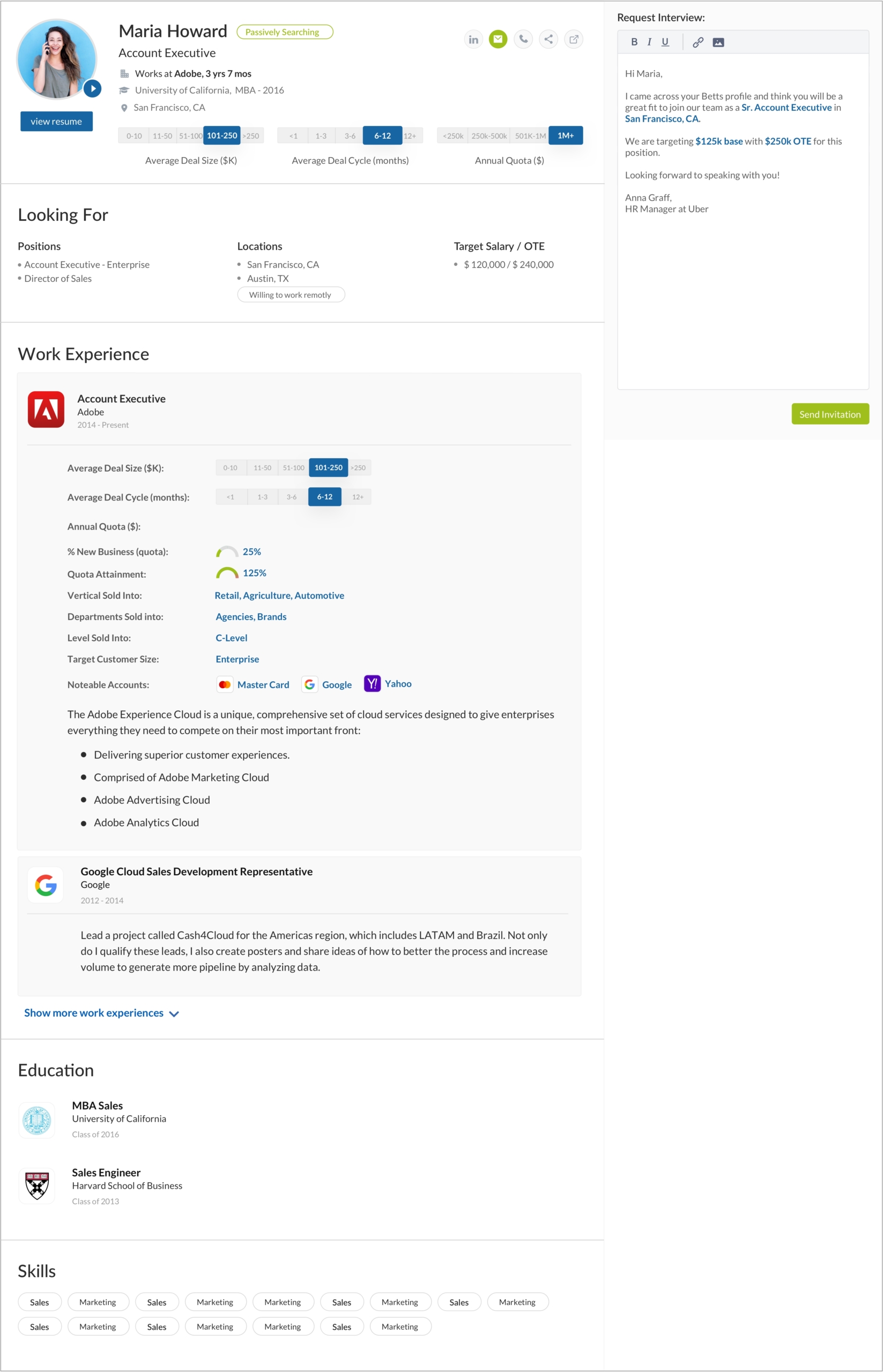If we had to think of one sentence that sums up Josh Humbert’s advice for young sales professionals, it would be: Don’t be afraid to have high standards.
Josh is a Business Development Representative (BDR) at DialogTech, a Chicago-based MarTech platform, where he works enterprise accounts in financial services, travel, healthcare, and other industries. He’s also a new Betts Connect user, and has already built a profile curated with key aspects of his professional experience and goals, such as pipeline quotas, target salary, and more.
We chatted with Josh about his current role, how he built solid interview skills, and his experience working with Betts and using Betts Connect. We also dove deeper into his advice for new sales pros and how to separate the best opportunities from the rest. Spoiler alert: He’s got a lot of wisdom to impart. Keep reading for the full interview.
Want to learn more about Betts Connect and try it out for yourself? Head to our Betts Connect page.
Diving Deep with Josh Humbert
Betts Recruiting: Nice to be chatting with you, Josh. First, can you just give us an overview of your role at DialogTech?
Josh Humbert: I’m currently a BDR, on our outbound team. We work with enterprise customers within financial services, home services, travel, healthcare, insurance – those are kind of our wheelhouse. I started in June of last year and spent my first three months there as an SDR before being promoted to BDR. When I got promoted, I transitioned from inbound to outbound.
BR: And how did you originally link up with Betts Recruiting, and get set up in Betts Connect?
JH: At the time, I was working at a healthcare software company in Columbus, Ohio. I was also still finishing my degree at Ohio State. When I graduated, I was looking to move to Chicago, but didn’t have a ton of connections there. So I was trying to apply on my own, and it was pretty difficult. Then Katie from Betts ended up reaching out to me. I took the call with her and then she worked with me to find a spot here in Chicago.
“Other networks are great in their own ways, but there can be a lot of noise when you’re really trying to zero in on the right role. With Betts Connect, you cut out that noise.”
Josh Humbert, Outbound Business Development Representative, DialogTech
A little later, once your team started ramping up the Betts Connect platform, I got set up on the platform. I instantly saw how this is something that’s easy to navigate, and can make it much easier for people to link up with companies who are looking for someone with their exact professional profile. Other networks are great in their own ways, but there can be a lot of noise when you’re really trying to zero in on the right role. With Betts Connect, you cut out that noise. And one great feature is that you’re able to indicate how aggressively you’re looking to move – whether you’re actively searching, or passively searching, or, as is my case as someone who’s going strong at DialogTech, currently off the market.

BR: What was it like working with the Betts team?
The experience was not what I was expecting. Katie sent me one of the few personalized messages I’ve received from a recruiter. That was really nice. A lot of value for me came on the interview prep side. I do pretty well when I’m actually in the role, but during the interview process, it’s great to have somebody there to walk me through the process and prep me for each step. She would take calls when I needed it, and was flexible with my schedule. She worked really hard to make sure that I felt confident going to each interview. I felt extremely prepared, and felt like it was just a much smoother process.
Working with Katie exposed me to a ton of options as well. She was able to actually, I think, simplify why each company was different, and that was also extremely helpful. I’ll say that I would not apply to another sales job without working with Betts.
“A lot of value for me came on the interview prep side. I do pretty well when I’m actually in the role, but during the interview process, it’s great to have somebody there to walk me through the process and prep me for each step.”
Josh Humbert, Outbound Business Development Representative, DialogTech
BR: Your point about the interview process is really important. A lot of people think that as long as they know they’re qualified for the job, they’ll inevitably nail the interview. But that’s misguided, right? Interviewing is its own, separate skill, and it’s really important to sharpen that skill no matter what the role is.
JH: One hundred percent. You know, when I was in school, I just don’t think I had a lot of training or resources to build that skill set. I hadn’t thought about it that way, and having Betts there to coach me on interviewing, to help me build those skills, was awesome.
“I would not apply to another sales job without working with Betts.”
Josh Humbert, Outbound Business Development Representative, DialogTech
BR: When you’re in the interview process and you’re evaluating job opportunities or offers, how do you differentiate between a great opportunity and one that’s maybe not so promising? How do you identify red flags?
JH: Well, the thing is, on paper, almost every single SDR or BDR role looks just about the same. So for me, the thing was having the confidence in myself to know that in an interview, they’re not just interviewing you – you’re interviewing the company, as well. So one thing that people who are just starting out in the workforce should know is: ask your interviewer hard questions. The worst thing you can do is ask easy questions that are layups, and find yourself in a role that, three months in, you realize isn’t a good fit for you.
I had really strict criteria. The most important thing was that I wanted to know my progression plan, and what I needed to do to go from SDR to BDR to AE. To me, that’s one of the most important answers to get. What does it take to get each of those promotions? What are the metrics someone has to meet to get a promotion, and what’s the standard timeline for promotions? That would definitely be a red flag if they can’t give you that in the interview process. I think that’s a really easy way to find yourself spinning your wheels.
“Ask your interviewer hard questions. The worst thing you can do is ask easy questions that are layups, and find yourself in a role that, three months in, you realize isn’t a good fit for you.”
Josh Humbert, Outbound Business Development Representative, DialogTech
BR: Yeah, especially in a profession like sales, where it’s pretty standard for there to be a clearly defined promotion path. So if a company is being standoffish when a candidate asks them about that, I would agree. That’s certainly a pretty big red flag.
JH: Yes, definitely.
BR: So what’s some more general, or broader, advice you’d have for up-and-coming sales professionals? By now you’ve had a few years of professional experience in sales, and between DialogTech and previous companies where you’ve worked, you’ve seen the whole spectrum of SDR, AE, and all around the block. If you were talking to someone who was just starting out, what would you tell them based on your own experience?
JH: You’ve got to focus on mindset. That’s really what it comes down to. It’s very difficult to prospect all day. It’s hard to make cold calls and send cold emails. What I’ve seen consistently from reps is the people who can maintain a positive mindset, and make that a central focus, I find it’s so much easier and more fulfilling. There’s a hundred books I could recommend, but I always start with The Happiness Advantage. I think I read that eight months into my first software role, and I’d recommend it to anybody who’s going through the same progression. So that’s the first thing I’d say.
The second thing is…well, coming into Dialog Tech, I had this perspective, and I had this idea, that my goal was to make sure I was on the most successful team possible, rather than just trying to be the top individual contributor. It kind of was an abundance mindset, but the idea was that there’s enough out there for everybody to be successful and have the kind of impact where it’s not just about you, it’s about the entire team. The impact you can make is much greater, and you’ll move up much faster.
“There’s enough out there for everybody to be successful and have the kind of impact where it’s not just about you, it’s about the entire team.”
Josh Humbert, Outbound Business Development Representative, DialogTech
BR: One last thing: What’s next? Where do you see your sales career going from here? What are some professional goals that you have for the near to medium term, or even longer?
JH: I’ve enjoyed helping grow and develop the people around me. So my long-term goal is I would love to stick around here long enough to move into a leadership path. That’s one of the things that drew me to DialogTech in the first place. I’d like to kind of pay it forward in terms of what I’ve learned so far. I think all the signs are pointing in that direction. I think there’s a ton of room for growth and I think there’s definitely potential here.
BR: That’s awesome. It sounds like you’re on the path and it sounds like you don’t just know what you want, but understand the importance of knowing what you want. I’m thinking also about your answer from a moment ago about distinguishing a good job offer from a not-so-good one. All of that’s about figuring out where your head is at. It seems like that’s something that you’ve got working for you.
Josh, thanks so much for talking with us today.
JH: This was fun, thanks for the opportunity!
